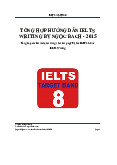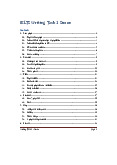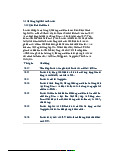




Preview text:
PRACTICE CLOZE TEST 1
How to make your business guests happy
Today, you don't do business only in your office. All over the world, people understand that it is important to
(1) …………. business partners, customers and suppliers. When you plan to eat (2) …………. with your
visitors, there are (3) …………. rules to remember.
First, don't take them to a restaurant that nobody knows! You want a place with a (4) ………. atmosphere,
delicious food and efficient service. So if you do not know where to go, ask your friends and colleagues to
(5) …………. a restaurant. Secondly, choose a restaurant with a varied menu so everybody can find a (6)
…………. they like or want to try. Remember too that some of your guests may be (7) …………..
Finally, relax and be (8) …………. to cultural differences. (9) …………. people are very happy with just
main course and do not want to spend a lot of time over lunch or dinner. Others like big meals and
expect aperitif, (10) …………., main course, dessert and coffee! 1) A. do B. reply C. entertain D. write 2) A. out B. through C. on D. off 3) A. a little B. a few C. another D. the other 4) A. interested B. ridiculous C. amazed D. pleasant 5) A. leave B. regard C. recommend D. come 6) A. dish B. plate C. fork D. oven 7) A. freshmen B. chefs C. pedestrians D. vegetarians 8) A. close B. open C. opened D. embarrassing 9) A. The B. Either C. Some D. A lot 10) A. gourmet B. food C. menu D. starter PRACTICE CLOZE TEST 2
Last year's overall sales figures were excellent for Nielsen Electronics. In January, they (1) ……….. the
RU20 CD player, and (2) ……….. went up from 2,000 to 2,500 the next month. In March, sales (3) ………..
3,500. Sales then (4) ……….. at the same level through the next quarter, but they continued to go up in July
and August, when they increased (5) ……….. 4,000. Nielsen wanted to launch their (6) ……….. camcorder,
the DCC-N300, in September, but (7) ……….. problems delayed the introduction of this new model. So
Nielsen launched it at the end of October. Overall sales went down after August, and at the end of October
they were (8) ……….. 3,500. However, the DCC-N300 was very popular, and the overall (9) ……….. of
sales grew until the end of the year, (10) ……….. it reached 4,500. 1) A. laid B. introduced C. merged D. returned 2) A. sales B. purchases C. goods D. repairs 3) A. launched B. searched C. reached D. observed 4) A. founded B. owed C. serviced D. stayed 5) A. to B. with C. of D. on 6) A. product B. digital C. spreadsheet D. scene 7) A. household C. impact C. production D. recruitment 8) A. off B. with C. at D. for 9) A. quality B. series C. chain D. volume 10) A. which B. that C. when D. time PRACTICE CLOZE TEST 3
What is the secret (1) ……….. successful marketing? (2) ……….. answer is easy: think about your
customers. First, (3) ……….. market research to get some information about the customers' (4) ……….. .
Then, supply exactly what the customers want. A successful product needs to be at the (5) ……….. price,
and it needs to be available at the right place. This means that you (6) ……….. it in the right way.
Finally, how do you want to (7) ……….. the product to customers? Think about design, image, advertising –
in one (8) ………..: promotion. In conclusion, just remember: Product, Price, (9) ……….., and Promotion. 1
These are 'the four Ps' of the marketing mix. To (10) ……….. a product successfully, you need to get this mix right. 1) A. on B. with C. for D. of 2) A. An B. The C. Those D. A 3) A. to do B. do C. doing D. done 4) A. needs B. base C. news D. workload 5) A. correct B. high C. right D. accept 6) A. delivery B. distribute C. contribute D. purchase 7) A. present B. check C. register D. study 8) A. phrase B. idiom C. proverb D. word 9) A. Productivity B. Place C. Production D. Presentation 10) A. marketing B. launching C. market D. introducing PRACTICE CLOZE TEST 4
When people hear the word culture, they often think about the cultural life, the history or the (1)
……….. of a country. But when you are in business, you also need to think about company cultures.
Companies have different cultures: they believe (2) ……….. different things, and they have different ways
of working. For example, some companies are formal, so staff use family (3) ……….. when they
speak to each other, and they have to wear business (4) ………..
Other companies have a system of (5) ……….. Fridays, (6) ……….. staff can wear anything they like at
the end of the week. Sometimes, there are also big (7) ……….. in the amount of time-off that staff can get.
In some companies, staff get more paid annual (8) ……….. than in others, for example. Or staff can
choose when they start and finish work - a system called (9) ………... People can start work at 8, 9 or 10
a.m. and finish at 4, 5 or 6 p.m. Finally, bosses and employees can communicate in many different ways.
Some line managers like to get regular written reports, but others prefer (10) ……….. communication. 1) A. customs B. cultures C. habits D. personalities 2) A. with B. of C. within D. in 3) A. surnames B. trees C. last names D. names 4) A. skirts B. perfume C. suits D. earrings 5) A. formal B. casual C. unusual D. annual 6) A. which B. that C. when D. at which 7) A. similarities B. numbers C. difficulties D. differences 8) A. make B. take C. leave D. left 9) A. schedule B. timetable C. agenda D. flexitime 10) A. directly B. indirectly C. via D. face-to-face PRACTICE CLOZE TEST 5 Doing business in Japan
People planning to do business in Japan should know (1) ……….. things about the country, its tradition and
its people. First of all, you should hire a good (2) ……….. - someone who speaks the language and who
knows the customs and traditions. Many people in Japan (3) ……….. hands when they meet, but you (4)
……….. be too fast. You should wait and see if they (5) ……….. their hand first. When somebody gives you
their business card, you should look (6) ……….. it and read it carefully. You shouldn’t write (7) ……….. it,
because Japanese people (8) ……….. this is very impolite. Some advice about meetings – you shouldn’t
worry about (9) ……….. during a meeting. You should respect those silences. And finally, remember that
you shouldn’t make too much eye (10) ……….. 1) A. a lot B. plenty C. a few D. a great deal 2) A. translator B. interpreter C. spokesman D. statesman 3) A. held B. shake C. take D. show 2 4) A. wouldn’t B. mustn’t C. aren’t able to D. shouldn’t 5) A. wave B. leave C. offer D. pull 6) A. at B. up C. for D. out 7) A. at B. on C. above D. with 8) A. concern B. brainstorm C. exploit D. think 9) A. silences B. noises C. quarrels D. dumbness 10) A. contact B. view C. sight D. content PRACTICE CLOZE TEST 6
Many people visit supermarkets. Supermarkets have so many things that it is hard to keep track of
everything. This is why supermarkets use a (1) ……….. of modern technology. They (2) ………..
technology to make shopping quicker (3) ……….. easier.
Barcodes are on every product (4) ……….. the supermarkets. The barcode system shortens cashier lines
because fewer mistakes are (5) ……….. The cashier scans barcodes through a scanner. The scanner (6)
……….. the code and adds the total amount. When all the items (7) ……….. scanned, the computer displays the total price.
(8) ……….. barcodes have been popular, there is a new technology overtaking barcodes. The system is
called RFID. Instead of (9) ……….., every item in the supermarket will have small microchips. This system
automatically bills the shopper (10) ……….. the purchases. This can save a lot of time. 1) A. lot B. number C. amount D. plenty 2) A. make B. use C. invent D. get 3) A. or B. but C. and D. for 4) A. with B. on C. upon D. in 5) A. done B. made C. invented D. appreciated 6) A. reads B. sees C. writes D. says 7) A. are B. have C. were D. got 8) A. If B. Although C. Despite D. Because 9) A. technology B. scanners C. barcodes D. cashiers 10) A. with B. of C. within D. for PRACTICE CLOZE TEST 7
The Key is Customer Satisfaction
The key to most businesses' success is customer satisfaction. Giving customers everything they expect and
more (1) ……….. customers to return. The best way to (2) ……….. on to customers is to provide (3)
……….. service, accurate information, and constantly add (4) ……….. and more value to your products and (5) ………..
In order to improve your (6) ……….. service department, you need to ask (7) ……….. questions to improve
your services. (8) ……….. your company’s customer care policies and (9) ……….. ask how to improve
customer (10) ……….. so that you can stay competitive in these changing times.
Keep your clients happy and your business grows and improves. It's as simple as that. 1) A. causes B. lets C. makes D. Shows 2) A. link B. keep C. hold D. support 3) A. assisted B. luxurious C. value D. friendly 4) A. least B. more C. most D. less 5) A. names B. services C. branch D. care 6) A. friend B. partner C. customer D. company 7) A. lots B. such C. same D. new 8) A. Review B. Report C. Redo D. Regain 9) A. rarely B. once C. continually D. never 10) A. quality B. satisfaction C. ability D. requirement 3 PRACTICE CLOZE TEST 8
Money is something we take for granted in our lives. Some of us (1) ……….. we had more of it, but we all
recognize it when we see it, (2) ……….. in the form of coins, notes, or cheques. It is difficult to imagine
how people manage (3) ……….. money. In the earliest periods of human history, people used to exchange
goods (4) ……….. They would exchange things they had (5) ……….. of for things they were in (6)
……….. of. For example, they might offer food (7) ……….. tools. This method of exchange, which is
known as (8) ……….., has many disadvantages. Certain goods may be difficult to carry; they may not last
long, or may be impossible to divide into (9) ……….. units. It can also be very difficult to know the worth
of something (10) ……….. with other goods. 1) A. wish B. adore C. love D. care 2) A. or B. whether C. and D. also 3) A. on B. off C. without D. by 4) A. silently B. currently C. exactly D. directly 5) A. plenty B. more C. out D. few 6) A. supply B. need C. target D. lend 7) A. of B. to C. for D. from 8) A. barter B. exchange C. refund D. reimburse 9) A. bigger B. smaller C. larger D. enormous 10) A. repaired B. refined C. compared D. combined PRACTICE CLOZE TEST 9
Most Office Workers Don’t Like the Boss
Last year, a survey of office workers’ attitudes was carried out. In (1) ……….., the researchers wanted to
know what employees felt about the company they worked for. The researchers were not surprised (2)
……….. find that most people wanted (3) ……….. money, shorter working hours, longer holidays and so
on, (4) ……….. they were amazed to find out that nearly 75% of employees (5) ……….. a very poor
opinion of their boss. Office workers had (6) ……….. to say about the President or Chairman of the
company, but they had very strong feelings about their immediate supervisor: their office manager or
supervisor. The three most usual criticisms of these middle managers were that they were not very good (7)
……….. their jobs; that they always blamed somebody else when things (8) ……….. wrong; that they
seemed to spend a lot of time (9) ……….. from one office to another instead of getting on with (10) ……..
own work. In fact, most employees thought that they could do their boss’s job much better. 1) A. summary B. particular C. short D. case 2) A. with B. at C. for D. to 3) A. more B. much C. less D. many 4) A. and B. but C. so D. neither 5) A. had B. were C. got D. took 6) A. something B. anything C. everything D. nothing 7) A. with B. for C. at D. about 8) A. went B. gone C. been D. go 9) A. run B. running C. runs D ran 10) A. their B. an C. some D. the PRACTICE CLOZE TEST 10
NEW OPPORTUNITIES WITH AN OPEN UNIVERSITY DEGREE
Like any other university, the Open University can give you a degree. However, you don't have to (1)
……………. working to study. It can also open up a whole variety (2) ……………. interests.
If you have (3) …………….studied before, you enjoy the special, new pleasure of (4) ……………. your
knowledge. You will make friends of (5) ……………. kinds. You may also (6) ……………. that
qualification provides new career opportunites. 4
You don’t actually (7) ……………. to the Open Univety for lectures, but study at home, using television.
radio and computer software. You can (8) ……………. one class a month if you wich at an Open University
Centre. Of course, there are exams to take, as in (9) …………….university.
If you (10) ……………. like to know more, all you have to do is complete the form below. It could be the
start of a wonderful new period in your life 1. A. stop B. end C. break D. leave 2. A. from B. of C. In D. for 3. A. ever B. never C. often D. always 4. A. growing B. changing C. adding D. increasing 5. A. all B. each C. both D. every 6. A. suggest B. find C. wish D. want 7. A. join B. enter C. arrive D. go 8. A. give B. attend C. learn D. study 9. A. any B. some C. many D. most 10. A. did B. will C. would D. can 5




